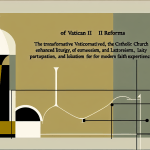Catholicism and Mental Health: A Holistic Perspective
In contemporary society, mental health has emerged as a critical topic, with increasing awareness about the importance of mental well-being. This blog post explores Catholicism and mental health, delving into how the teachings of the Catholic Church intersect with mental wellness. We will examine the Church’s perspective on mental health, the impact of faith on psychological well-being, and practical ways to seek help in the light of Catholic teachings.
Understanding Mental Health
Mental health encompasses our emotional, psychological, and social well-being. It affects how we think, feel, and act. It also plays a crucial role in how we handle stress, relate to others, and make choices. Furthermore, mental health issues such as anxiety, depression, and bipolar disorder are increasingly recognized as common experiences that can affect anyone, regardless of faith or background.
Catholicism’s Stance on Mental Health
The Human Person in Catholic Teaching
Catholicism has a comprehensive view of the human person, emphasizing the dignity and worth of every individual. The Catechism of the Catholic Church teaches that humans are made in the image and likeness of God, which extends to the realm of mental and emotional health. Acknowledging this divine image implies that mental health issues deserve attention and compassion.
The Importance of Healing
Healing is a recurring theme in Catholicism, with Jesus Christ often portrayed as a healer. The Gospels recount numerous instances where Jesus healed the sick and comforted the afflicted. This narrative emphasizes that in Catholic teaching, mental health struggles are not just personal failings but can be viewed as part of the broader human experience. The Church encourages those facing mental health challenges to seek healing, which can come through prayer, community support, and professional help.
The Intersection of Faith and Mental Wellness
The Role of Prayer and Sacraments
Prayer can be a powerful tool for those struggling with mental health issues. In Catholicism, prayer is a way to connect with God, providing comfort and solace. Engaging in regular prayer can reduce feelings of anxiety and depression. The sacraments, particularly Confession and the Eucharist, also serve as significant sources of grace, reinforcing one’s spiritual health and offering peace amidst turmoil.
Community Support and Connection
Catholic congregations often form strong community bonds that can provide essential support for those facing mental health challenges. The concept of community, or ‘koinonia,’ emphasizes the importance of belonging and companionship. Being part of a parish can foster relationships that offer emotional support, a sense of belonging, and opportunities for service, all of which can positively impact mental health.
The Power of the Saints
Catholicism teaches that the saints can intercede for us, providing spiritual support in our struggles. Many saints have faced significant mental health challenges themselves, and their stories can serve as a source of inspiration. For example, St. Dymphna is recognized as the patron saint of the mentally ill. Praying for their intercession can provide comfort and a sense of connection during difficult times.
Addressing Mental Health Issues within the Church
Barriers to Seeking Help
Despite the Church’s teachings on compassion and healing, many Catholics still face barriers when it comes to discussing mental health. Stigma surrounding mental illness can prevent individuals from seeking help. Some may fear judgment or believe that their struggles reflect a lack of faith. It’s crucial for the Church to foster open dialogue about mental health, encouraging individuals to view seeking help as a strength rather than a weakness.
Integrating Faith with Professional Support
Catholicism encourages a holistic approach to mental health, integrating both faith and professional support. It’s essential for individuals battling mental health challenges to seek therapy and counseling, alongside their spiritual practices. Catholic therapists can provide specialized care that aligns with an individual’s faith, making the healing process more harmonious. Many Catholic organizations and dioceses offer resources to help individuals find faith-based mental health services.
Practical Steps for Promoting Mental Wellness in Catholic Communities
1. Promote Awareness and Education
Catholic parishes can initiate programs to educate their members about mental health. Workshops, guest speakers, and support groups can help destigmatize mental health issues and foster a culture of understanding and support within communities.
2. Create Safe Spaces for Sharing
Establishing small groups where individuals can share their struggles in a supportive environment can encourage openness. These sacred spaces allow members to express their concerns and experiences without fear of judgment.
3. Encourage the Use of Professional Resources
Encouraging members of the parish to seek out professional mental health resources is vital. This can be done by providing a list of recommended therapists and organizations that integrate Catholic values into their practice.
4. Incorporate Mental Health into Sermons and Catechesis
Incorporating mental health discussions into sermons and catechetical instruction can help normalize conversations around this subject. Pastors and catechists can highlight the Church’s teachings on mental health, alongside scriptures that promote seeking healing and support.
The Spiritual Dimension of Mental Health
Prayer and Meditation as Healing Practices
In addition to traditional forms of therapy, prayer and meditation can play a vital role in mental health. Catholics can incorporate meditative practices into their daily routines, using scripture and prayer to foster peace and serenity. Techniques such as centering prayer or the Rosary can help individuals focus their thoughts and achieve a sense of calm.
Finding Hope Through Faith
For many, faith serves as a beacon of hope during challenging times. The belief in a loving God who cares for every individual can provide comfort. Encouraging individuals to lean into their faith during difficult mental health struggles can be a powerful source of resilience.
Conclusion
In conclusion, the relationship between Catholicism and mental health is an essential discussion that requires ongoing attention and action. By openly addressing mental health issues within the context of faith, the Church can help its members find healing and hope. Through community support, prayers, and the integration of professional help, Catholics can navigate the complexities of mental health challenges with courage and compassion. Embracing mental health as a vital component of holistic well-being aligns with the core teachings of the Catholic faith, ultimately fostering a healthier and more supportive community.
By creating an environment where mental health is discussed with empathy and understanding, the Church can serve as a sanctuary of hope for those in need, illustrating that faith and healing can go hand in hand.




